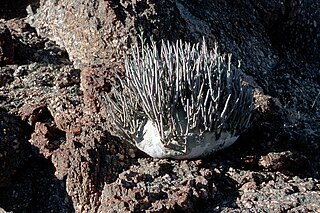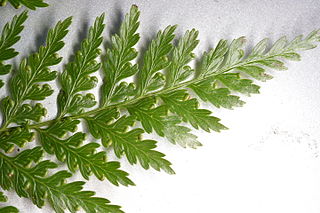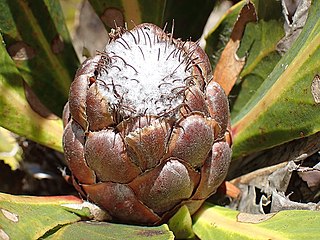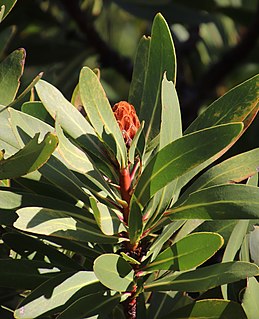
Ziziphus is a genus of about 40 species of spiny shrubs and small trees in the buckthorn family, Rhamnaceae, distributed in the warm-temperate and subtropical regions throughout the world. The leaves are alternate, entire, with three prominent basal veins, and 2–7 cm (0.79–2.76 in) long; some species are deciduous, others evergreen. The flowers are small, inconspicuous yellow-green. The fruit is an edible drupe, yellow-brown, red, or black, globose or oblong, 1–5 cm (0.39–1.97 in) long, often very sweet and sugary, reminiscent of a date in texture and flavour.

Olea is a genus of about 40 species in the family Oleaceae, native to warm temperate and tropical regions of the Middle East, southern Europe, Africa, southern Asia, and Australasia. They are evergreen trees and shrubs, with small, opposite, entire leaves. The fruit is a drupe. Leaves of Olea contain trichosclereids.

Adenia is a genus of flowering plants in the passionflower family, Passifloraceae. It is distributed in the Old World tropics and subtropics. The centers of diversity are in Madagascar, eastern and western tropical Africa, and Southeast Asia. The genus name Adenia comes from "aden", reported as the Arabic name for the plant by Peter Forsskål, the author of the genus.

Froelichia, or snakecotton, is a genus of plants in the family Amaranthaceae.
Swintonia is a genus of plants in the family Anacardiaceae.

Uncarina is a genus of plant in the family Pedaliaceae found in Madagascar.

Culcita is a genus of ferns, native to the Americas, Macaronesia and Iberian Peninsula. It is the only genus in the family Culcitaceae in the Pteridophyte Phylogeny Group classification of 2016. Alternatively, the family may be treated as the subfamily Culcitoideae of a very broadly defined family Cyatheaceae, the placement used for the genus in Plants of the World Online as of November 2019.

Drimycarpus is a small genus of trees in the cashew and sumac family Anacardiaceae. The generic name is from the Greek meaning "pungent fruit".

Holigarna is a genus of trees in the subfamily Anacardioideae of the cashew and sumac family Anacardiaceae. They grow naturally in India, Bangladesh and Indo-China. This is a poisonous tree if contacted it would irritate skin chemically and result in irreversible skin damage. Smoke from burning this wood is dangerously disabling.

The Interim Register of Marine and Nonmarine Genera (IRMNG) is a taxonomic database which attempts to cover published genus names for all domains of life from 1758 in zoology up to the present, arranged in a single, internally consistent taxonomic hierarchy, for the benefit of Biodiversity Informatics initiatives plus general users of biodiversity (taxonomic) information. In addition to containing over 490,000 published genus name instances as at March 2020, the database holds over 1.7 million species names, although this component of the data is not maintained in as current or complete state as the genus-level holdings. IRMNG can be queried online for access to the latest version of the dataset and is also made available as periodic snapshots or data dumps for import/upload into other systems as desired.

Protea vogtsiae, also known as the Kouga sugarbush, is a small flowering shrub of the genus Protea within the family Proteaceae, which is only found growing in the wild in the southern Cape Region of South Africa.
Achyropsis is a genus of plants in the amaranth family, Amaranthaceae that is found in Africa distributed from Kenya to South Africa.
Centemoposis is a genus of plants in the amaranth family, Amaranthaceae and is found in Africa distributed from Tropical Africa to South Africa.
Dasysphaera is a genus of plants in the amaranth family, Amaranthaceae and is found in Africa distributed in north-east and east tropical Africa.

Protea rubropilosa, also known as the Transvaal sugarbush, escarpment sugarbush or Transvaal mountain sugarbush, is a flowering tree, that belongs to the genus Protea in the family Proteaceae. The plant only occurs in South Africa.

Protea pudens, also known as the bashful sugarbush, is a low-growing, groundcover-like, flowering shrub in the genus Protea. It is only found growing in the wild in a small area in the Western Cape province of South Africa.

Protea punctata, also known as the water sugarbush or water white sugarbush, is a shrub belonging to the genus Protea which is found growing in the wild in South Africa.

Pterodiscus is a genus of plant in the Pedaliaceae family comprising several species with a native range from Ethiopia to S. Africa. The range passes through the countries of Angola, Botswana,, Ethiopia, Kenya, Mozambique, Namibia, Somalia, Sudan, Tanzania, Zambia and Zimbabwe. Plus it is found also within the Provinces of South Africa in Cape Provinces, Free State, KwaZulu-Natal and Northern Provinces.














